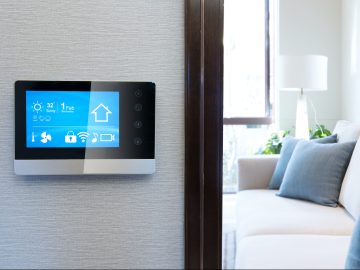Network security is something that affects just about everyone. With so many risks in our increasingly connected world, it’s no wonder why even the most innocent among us should care about securing their network at home and in the office. So how can we secure our network at home and in the office?
When thinking about network security, you need to know who your biggest threat is: the outside world . While this might seem obvious, a surprising number of people believe they don’t have much to worry about from all those strangers out there on the Internet, but hackers aren’t nearly as concerned with stealing your identity or running up your credit card bill as they are breaking into your networks and computers. The truth is, most malicious activity from hackers is directed towards infecting as many computers as possible with malware, and then using those infected machines to do the dirty work of spreading viruses or spam or launching denial of service attacks.
How can I secure my home network?
It’s quite easy when you take the proper precautions, which might include anything from installing updated antivirus software to changing default passwords on Wi-Fi routers. While your home network is likely something you have taken care of in the past, it certainly doesn’t hurt to find out what kind of security protocols are in place so that you can maintain them.
How do I secure my office network?
Since most offices and businesses use a combination of hardwired and wireless networks, it’s important to understand how each one works and how they can be configured for maximum protection against attacks – either external or internal – as well as maintaining optimal performance for your users. Reviewing potential threats and discussing ways to remedy them is advised , but ultimately keeping an eye on things and making sure all network components are up to date and secure is your best bet for keeping the bad guys out and the good guys in.
It’s important to note that there isn’t a one-size-fits all solution or security protocol . The specific needs of each business or office will vary depending on their size, structure, and industry , but many solutions for wireless connectivity can be applied across networks of all kinds. No matter what you’re trying to protect – home computers, laptops, smartphones – it pays off to invest in proper antivirus/anti-malware software and keep those programs updated with the latest virus definitions. This will ensure protection from hackers even if they manage to slip through other security measures (and they know how to do it).
How can we secure our network at home and in the office??
While you as an individual cannot control all aspects of your wireless or fixed wired network, there are some basic measures that can be taken to increase security. One of the most important things is to make sure all software – both on your hard drive and installed programs – is up to date and running with the latest patches and updates. This includes software like Java (which has been a notorious trouble spot for many network users), browser plug-ins, any applications you use on your computer, smartphone apps, etc. Making sure these sorts of programs are kept up to date will also allows you take advantage of new features.
Just as importantly, though, is the need to properly secure all your passwords – particularly those used for accessing your wireless networks and computers. While it’s understandable if you don’t want to go around asking other people (or even remembering) the password to access certain websites or services, make sure whatever you use is not easily guessed or obtained. To see how good – or bad – your passwords are, visit the site WhatIsMyIPAddress.com , which uses a variety of methods to automatically test as many as 70 million combinations in just seconds!
As scary as that sounds, it’s important to remember not everyone has ill intentions when they’re scanning open networks looking for easy targets . In fact, most hackers have very little knowledge of who their victims are so sometimes the best thing you can do is just a bit of research in order to protect yourself.
You know that old saying about an ounce of prevention being worth a pound of cure? It’s true – there are ways to prevent attacks like this before they happen. Know who you’re connecting with online. Be suspicious of strangers asking for access to your computer, especially if they ask you to install something on it.
If someone does manage to break into your network, don’t panic; just strategize . While there’s nothing that can be done at that moment without extensive help from a professional, there are lots of ways you can reduce the chance that it will happen again in the future. Be aware of phishing scams, where someone sends you an email pretending to be from a reputable source and asks you for personal information or installs malware disguised as software updates. Keep your computer’s security software up-to-date, and make sure you have a firewall protecting your network at all times. Most importantly, monitor everything going on across your network .
So how can we secure our network at home and in the office? It may not be much fun to think about all these nitty gritty details of how to protect yourself online, but in the long run it’s definitely worth it. A little bit of vigilance now can save you the serious headache of having your online life ruined by hackers!
